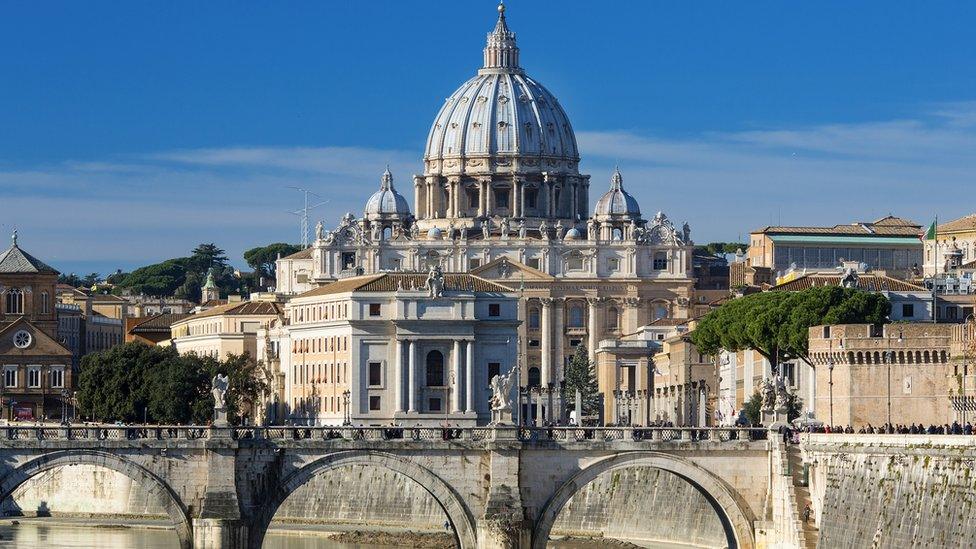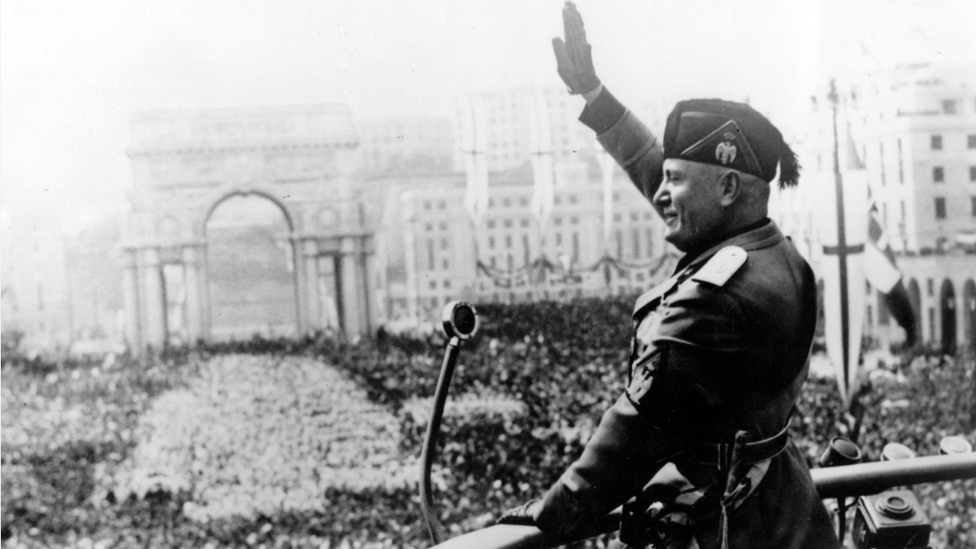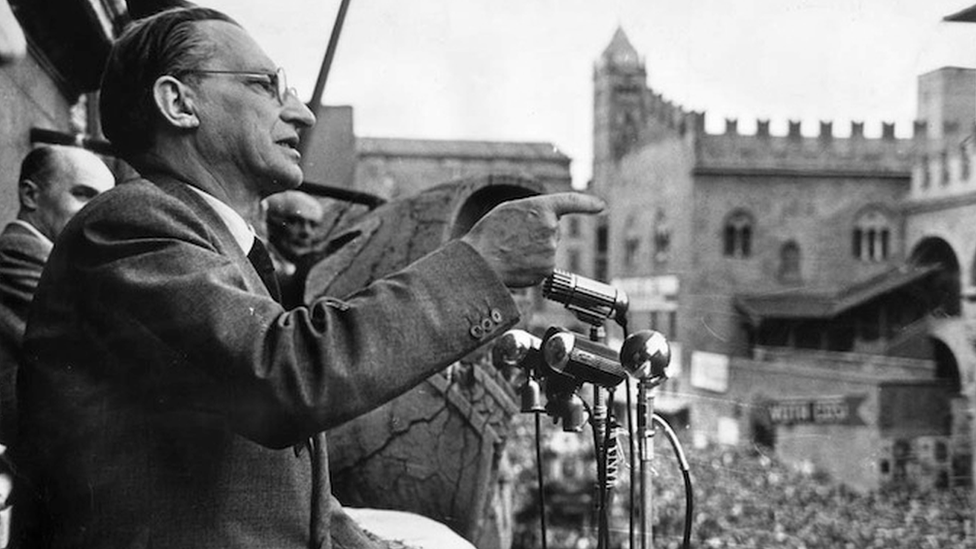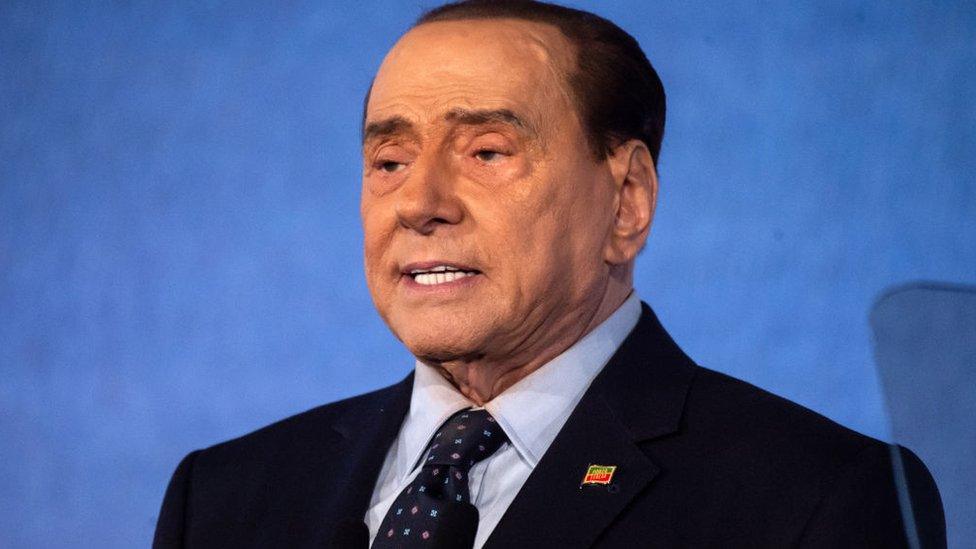Italy profile - Timeline
- Published

A chronology of key events:
1861- The unification of Italy, also known as the Risorgimento, sees the consolidation of different states of the peninsula into a single state under King Victor Emmanuel II.
1871 - Unification is completed by the capture of Rome and its designation as the capital of the modern state of Italy.
1915 - Italy enters World War One on side of Allies.
1919 - Italy gains Trentino, South Tyrol and Trieste from Austria-Hungary under the post-war peace treaties.
Fascist rule

Benito Mussolini ruled Italy for 21 years
1922 - Fascist leader Benito Mussolini forms government after three years of political and economic unrest, then establishes authoritarian system.
1935 - Italy invades Ethiopia.
1936 - Benito Mussolini forms an alliance with Nazi Germany.
1939 - Italy annexes Albania.
1940 - Italy enters World War Two on German side. Italian forces occupy British Somaliland in East Africa.
1940-41 - British and allied forces drive Italian troops out of East Africa
1943 - Sicily and then mainland Italy is invaded by the Allies. Benito Mussolini overthrown, armistice signed with Allies. Italy declares war on Germany.
1945 May - Axis forces in Italy surrender. German Benito Mussolini, who had been rescued from prison by Germans in 1943 to set up a puppet fascist state in northern Italy, is captured and executed by Italian partisans.
Towards European integration
1946 - Referendum votes for republic to replace monarchy.
1947 - Italy cedes land and territories under peace treaty.
1948 - New constitution. Christian Democrats win elections.
1951 - Italy joins European Coal and Steel Community.
1957 - Founder member of European Economic Community.

Alcide De Gasperi led Italy in the early post-war years
1972 - Giulio Andreotti becomes prime minister - a post he will hold seven times in 20 years.
1976-78 - Communist election gains lead to voice in policy making.
1978 - Former Prime Minister Aldo Moro kidnapped and murdered by left-wing armed group, the Red Brigades. Abortion legalised.
1980 - Bombing of Bologna station kills 84, linked to right-wing extremists.
1983 - Bettino Craxi becomes Italy's first Socialist prime minister since war.
1984 - Roman Catholicism loses status as state religion.
1991 - Communists rename themselves Democratic Party of the Left.
Corruption probe
1992 - Revelations of high level corruption spark several years of arrests and investigations.
Top anti-Mafia prosecutor, Giovanni Falcone, his wife and three bodyguards killed in car bomb attack.
1993 - Bribery scandal leads to Mr Craxi's resignation as leader of Socialist Party. He later flees the country, is tried and sentenced in absentia to imprisonment but dies in Tunisia in 2000.
1994 March - Freedom Alliance wins election. The coalition, which includes Silvio Berlusconi's Forza Italia, the Northern League and the neo-Fascist National Alliance, collapses by end of year following clashes with anti-corruption magistrates and a battle with trade unions over pension reform.
1995-96 - Lamberto Dini heads government of technocrats. Austerity budget.
1996 - Centre-left Olive Tree alliance wins election. Romano Prodi becomes prime minister.
1997 - Earthquakes strike Umbria region, causing extensive damage to Basilica of St Francis of Assisi. Four killed.
Berlusconi comeback
2001 May/June - A centre-right coalition, led by Silvio Berlusconi of the Forza Italia party, wins the general elections.
Berlusconi forms new coalition government which includes the leaders of two right-wing parties, Gianfranco Fini of the National Alliance and Umberto Bossi of the Northern League as well as the pro-European-Union Renato Ruggiero, who becomes foreign minister.
2001 Oct - First constitutional referendum since 1946 sees vote in favour of major change giving greater autonomy to the country's 20 regions in tax, education and environment policies.
2002 Jan - Euro replaces the lira.

Media tycoon Silvio Berlusconi has been a dominant player in Italian politics, and been prime minister four times
Berlusconi in court
2003 November - Multi-billion euro fraud uncovered at Parmalat food-manufacturing giant. The company is declared insolvent.
2004 January - Constitutional Court throws out law granting Mr Berlusconi and other top state post holders immunity from prosecution. Mr Berlusconi's trial resumes in April, and he is cleared in December.
2005 April - Parliament ratifies EU constitution.
Prodi in, then out
2006 April - Centre-left leader Romano Prodi wins closely-fought general elections. He is sworn in as prime minister in May.
Italy's most-wanted man, suspected head of the Sicilian mafia Bernardo Provenzano, is captured by police.
2006 June - National referendum rejects reforms intended to boost the powers of the prime minister and regions. The changes were proposed during Silvio Berlusconi's premiership.
2006 August - Hundreds of Italian peacekeepers leave for Lebanon. Italy is set to become the biggest contributor to the UN-mandated force.
2008 January - A no-confidence vote forces Mr Prodi's government to resign.
Berlusconi back again
2008 April - Berlusconi wins general elections, securing a third term as prime minister after two years in opposition.
2008 November - After posting two consecutive quarters of negative growth, Italy is declared to be officially in recession.
2009 April - Earthquake strikes towns in the mountainous Abruzzo region, leaving hundreds of people dead and thousands homeless.
2009 October - Constitutional court overturns law that granted Premier Berlusconi immunity while in office.
Coalition splits
2010 August - Mr Berlusconi's coalition loses majority in lower house of parliament after more than 30 deputies break away from his People of Freedom party.
2011 February - A Milan judge orders Mr Berlusconi to stand trial in April on charges of abuse of power and paying for sex with an under-age prostitute.
2011 September - Parliament gives final approval to a 54bn euro (£47bn; $74bn) austerity package. The package contains a pledge to balance the budget by 2013.
Berlusconi quits
2011 November - Amid growing doubts about Italy's debt burden, Mr Berlusconi resigns after his government fails to gain a full majority in the Chamber of Deputies during a budget vote. Former European Union commissioner Mario Monti forms government of technocrats.
2011 December - Mr Monti's package of austerity measures amounting to 33bn euros of spending cuts gains parliamentary approval. The package also includes measures to raise taxes and tackle tax evasion.
2012 January - Government issues de-regulation decree designed to curb restrictive practices, reduce protectionism and encourage competition.
Berlusconi convicted
2013 March - Silvio Berlusconi is sentenced to a year in jail over an illegal wiretap. He remains free pending the outcome of the appeals process.
2013 April - Enrico Letta of the Democratic Party (PD) becomes prime minister at the head of a grand coalition that also includes Silvio Berlusconi's PdL, after Pier Luigi Bersani steps down as PD leader.
Berlusconi conviction upheld
2013 August - Italy's highest court upholds Silvio Berlusconi's sentencing for tax fraud in October 2012, in the former prime minister's first definitive conviction. Because of his age, he is sentenced to community service rather than prison and a two-year ban on holding public office.
2013 October - The governor of Sicily declares a state of emergency after hundreds of migrants die in shipwrecks while attempting to reach Europe from Africa.
2013 November - Senate expels Mr Berlusconi from parliament over his conviction for tax fraud, depriving him of his immunity from arrest.
2014 February - New Democratic Party leader and mayor of Florence, Matteo Renzi, forms a new left-right coalition government and unveils plans for major economic and political reform.
2014 July - Former Prime Minister Silvio Berlusconi wins an appeal against his conviction in June 2013 for paying for sex with an underage prostitute.
2014 August - The Senate, or upper house of parliament, votes to back Prime Minister Renzi's plans to drastically cut the chamber's size and powers.
2015 May - Parliament approves an electoral reform giving the largest party an automatic majority of seats in parliament.
2016 August - Earthquake rocks mountainous Apennine area of central Italy, causing extensive damage and casualties.
2016 November - Prime Minister Renzi resigns after his flagship constitutional reform package is overwhelmingly rejected in a referendum. He is succeeded by his Democratic Party ally Paolo Gentiloni.
2017 July - EU regulators approve a state bailout of the world's oldest bank, Monte dei Paschi, which has been at the centre of Italy's banking crisis.
2017 October - Veneto and Lombardy, two wealthy northern regions, vote overwhelmingly in favour of greater autonomy in non-binding referendums.
Rise of the populists
2018 June - Western Europe's first populist coalition government takes office after elections in March, with an agenda to cut taxes, boost welfare spending, and overhaul European Union budgets and immigration rules.
2018 December - Italy has to scale back budget spending plans after EU objections.
2019 August - Right-wing League party leader Matteo Salvini withdraws from the government in the hope of triggering early elections. But the radical 5-Star Movement and centre-left Democratic Party agree a new coalition without the League, with law professor Giuseppe Conte retaining his position as prime minister.
2020 January - League Party fails to unseat the left in key election in Emilia-Romagna.
2021 February - Mario Draghi, an economist and ex-governor of the Bank of Italy, forms a government of national unity to lead the country out of the coronavirus crisis.
2022 October - Giorgia Meloni becomes country's first female prime minister and leader of Italy's most right-wing government since 1945.